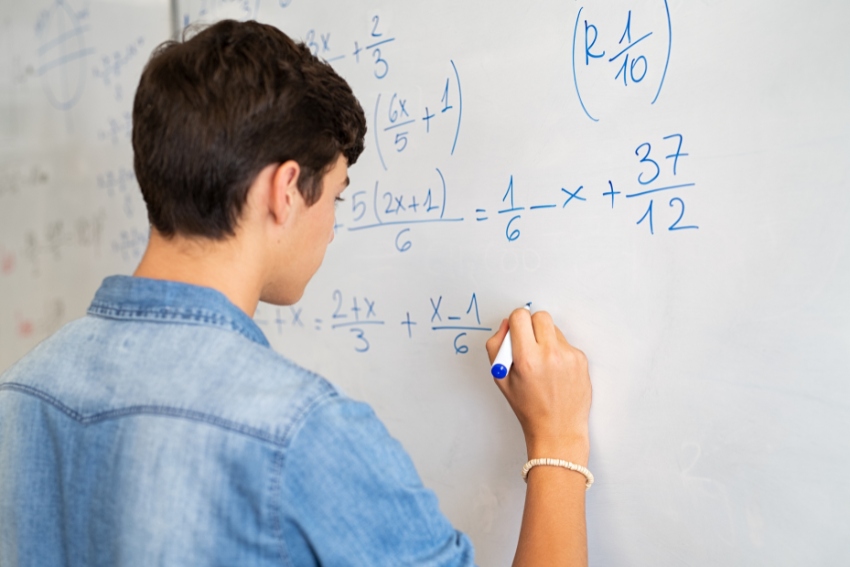GCSE Physics is one of the most important subjects in the GCSE curriculum, as it’s one of the five mandatory subjects. Many parents wonder how difficult it really is, especially since Physics is often listed among the hardest GCSE subjects. The level of difficulty can vary depending on the path your child takes, whether they’re studying Combined Science or Triple Science. The choice between the Foundation and Higher tiers also affects how challenging the content will be.
Despite these variations, the fundamental topics of GCSE Physics remain largely consistent across different exams and syllabuses. The differences lie mainly in the depth and breadth of content covered.
Here are GCSE Physics topics in 2025:
Energy

In GCSE Physics, energy is a dynamic concept that underpins almost every other topic in the field. It’s essential to understand not just the types of energy, but also how energy is conserved, transferred, and utilised in different contexts.
Key Areas of Focus
- Changes in Energy Stores
- Energy and Heating
- Energy Demands
- Work, Power, and Efficiency
Changes in Energy Stores
- What it’s about: The movement and transformation of energy from one form to another.
- Key concept: Calculating energy changes in systems like moving objects and compressed springs.
Energy and Heating
- What it’s about: The process of energy transfer as heat and its effects on substances.
- Key concept: How energy transfer affects temperatures and system energy.
Energy Demands
- What it’s about: The amount of energy required in various scenarios, from small gadgets to large-scale operations.
- Key concept: The varying energy needs of
- different devices and how this impacts overall energy consumption.
Work, Power, and Efficiency
- What it’s about: The relationship between the energy transferred when work is done, the rate of energy transfer (power), and how much energy is used for a useful outcome (efficiency).
- Key concept: Using the formula
Power = Work / Timeto calculate the power of processes and devices.
Expected Knowledge
- Calculating energy in different scenarios, like kinetic and potential energy.
- Understanding heat transfer methods: conduction, convection, and radiation.
- Relating everyday energy use to energy demand on a larger scale.
- Applying the formula for power in various contexts to determine efficiency.
- Evaluating the effectiveness of energy use in household and industrial appliances.
- Recognising the importance of energy conservation and efficiency in sustainable living.
Electricity
Electricity is a thrilling and essential topic within GCSE Physics, central to understanding the modern world. It covers the behaviour and applications of electrical phenomena.
Key Areas of Focus
- Electric Circuits
- Current, Voltage, and Resistance
- Domestic Electricity
Electric Circuits
- What it’s about: The paths through which electric current flows.
- Key concept: Designing and interpreting circuit diagrams, and understanding series and parallel circuits.
Current, Voltage, and Resistance
- What it’s about: The properties that characterize an electric circuit.
- Key concept: Calculating current, voltage, and resistance using Ohm’s Law (
V = IR), and understanding their interrelationships.
Domestic Electricity
- What it’s about: The use of electricity in the home.
- Key concept: Familiarity with household electrical systems, safety features, and energy calculations.
Expected Knowledge
- Constructing and analysing simple series and parallel circuits.
- Measuring and calculating current, voltage, and resistance.
- Knowing the functions of components like resistors, diodes, and capacitors.
- Understanding the National Grid and its role in electricity distribution.
- Recognising the different types of wires and plugs used domestically.
- Comprehending electrical safety measures, including fuses and circuit breakers.
- Calculating the cost of electricity use based on power ratings and time.
Particle Model of Matter
The particle model of matter is a cornerstone of physics, offering a framework for understanding the physical properties of matter by considering its structure at the microscopic level.
Key Areas of Focus
- Density and States of Matter
- Changes of State and the Particle Model
- Internal Energy and Temperature
Density and States of Matter
- What it’s about: The mass of matter contained in a unit volume and how the arrangement of particles defines the state of matter (solid, liquid, gas).
- Key concept: Calculating density (
Density = Mass / Volume) and distinguishing between the properties of solids, liquids, and gases.
Changes of State and the Particle Model
- What it’s about: How matter changes from one state to another and the theory explaining these changes.
- Key concept: Understanding the energy involved in changing state and how particle movement varies between states.
Internal Energy and Temperature
- What it’s about: The total energy that particles have within a system due to their individual motions and positions.
- Key concept: Relating temperature to the average kinetic energy of particles and understanding how heating changes the internal energy.
Expected Knowledge
- Applying the particle model to explain the properties and behaviours of different materials.
- Calculating the density of various substances and interpreting data from experiments.
- Describing the processes of melting, boiling, condensing, freezing, and subliming.
- Using the particle model to explain changes of state and the energy involved.
- Relating changes in temperature to changes in the internal energy of a system.
- Understanding the concept of specific heat capacity and specific latent heat.
Atomic Structure
Atomic structure is a fundamental concept in GCSE Physics that delves into the composition and properties of atoms, the building blocks of matter.
Key Areas of Focus:
- Composition of Atoms
- Radioactivity
- Nuclear Reactions
Composition of Atoms
- What it’s about: Understanding what atoms are made of and how these constituents are arranged.
- Key concept: Knowing the structure of atoms, including protons, neutrons, and electrons, and how this structure determines the chemical properties of elements.
Radioactivity
- What it’s about: The processes by which unstable nuclei release energy.
- Key concept: Grasping the types of radioactive decay (alpha, beta, and gamma) and the principles of nuclear radiation and its effects on matter.
Nuclear Reactions
- What it’s about: The changes in
the nucleus of an atom that can release or absorb energy.
- Key concept: Distinguishing between nuclear fission, where nuclei split, and nuclear fusion, where they combine, and understanding the applications and implications of these processes.
Expected Knowledge
- Identifying the different particles within an atom, including their relative charges and masses.
- Using the periodic table to deduce the number of protons, neutrons, and electrons in an atom.
- Explaining the process and implications of alpha, beta, and gamma decay, including safety precautions when handling radioactive materials.
- Describing how a Geiger-Müller tube and counter can be used to detect radiation.
- Understanding the concept of half-life and its role in radioactive decay and carbon dating.
- Applying knowledge of nuclear reactions to contexts such as nuclear power generation and the life cycle of stars.
Forces
Forces are a vital area of study in GCSE Physics, encompassing the interactions that govern motion and stability in the physical world.
Key Areas of Focus:
- Types of Forces
- Effects of Forces
- Force and Motion
Types of Forces
- What it’s about: The different kinds of forces that act on objects.
- Key concept: Understanding gravitational, electrostatic, magnetic, frictional, and tension forces, and how they affect objects.
Effects of Forces
- What it’s about: How forces influence the shape and motion of objects.
- Key concept: Investigating how forces can cause objects to start moving, speed up, slow down, change direction, or change shape.
Force and Motion
- What it’s about: The relationship between force applied to an object and the resulting motion, following Newton’s laws.
- Key concept: Using equations of motion and Newton’s laws to calculate how forces affect movement.
Expected Knowledge:
- Recognizing and describing different types of forces and their effects.
- Calculating resultant forces and understanding equilibrium.
- Applying Newton’s laws of motion to predict the behavior of moving objects.
- Explaining the concepts of inertia, mass, weight, momentum, and impulse.
- Understanding how forces cause acceleration and deceleration.
- Calculating work done by a force using the formula
Work done = Force x Distance. - Exploring the significance of force in real-world scenarios such as vehicle safety and sports science.
With a firm grasp of these concepts, students can comprehend the physical principles behind everyday phenomena and technological applications, from the brakes on a car to the flight of a rocket.
Waves
Waves are integral to understanding a wide range of physical phenomena in GCSE Physics, from sound and light to the entire electromagnetic spectrum.
Key Areas of Focus
- Properties of Waves
- Sound and Light Waves
- The Electromagnetic Spectrum
Properties of Waves
- What it’s about: The characteristics that define all waves, regardless of their nature.
- Key concept: Understanding terms like frequency, wavelength, amplitude, speed, and the difference between transverse and longitudinal waves.
Sound and Light Waves
- What it’s about: How sound and light are propagated as waves.
- Key concept: Exploring
how waves interact with materials through reflection, refraction, and absorption, and how this explains phenomena such as echoes or optical illusions.
The Electromagnetic Spectrum
- What it’s about: The range of electromagnetic waves by their frequencies and wavelengths.
- Key concept: Identifying the different parts of the spectrum, from radio waves to gamma rays, and understanding their various applications and effects on matter.
Expected Knowledge
- Describing wave properties and using wave equations to calculate speed, frequency, and wavelength.
- Explaining how sound waves are produced and detected, and how their speed varies in different media.
- Demonstrating how light waves are reflected and refracted, including the use of lenses and prisms.
- Understanding the uses and dangers of different types of electromagnetic waves.
- Applying knowledge of waves to real-life technologies such as radios, microwaves, and X-rays.
Magnetism and Electromagnetism
Magnetism and electromagnetism are phenomena that have significant applications in various fields, from engineering to medical sciences. They form an essential part of the GCSE Physics curriculum.
Key Areas of Focus
- Magnetic Fields
- Electromagnets and their Applications
- The Motor Effect and Electromagnetic Induction
Magnetic Fields
- What it’s about: The invisible areas around magnets where magnetic forces are exerted.
- Key concept: Understanding how magnetic fields are created and visualised, and the Earth’s magnetic field’s role in navigation.
Electromagnets and their Applications
- What it’s about: Magnets created by the flow of electric current.
- Key concept: Exploring how the strength of electromagnets can be controlled and their use in devices like electric bells and loudspeakers.
The Motor Effect and Electromagnetic Induction
- What it’s about: How electric currents can produce magnetic fields and vice versa.
- Key concept: Investigating how motors work based on the motor effect and how generators produce electricity through electromagnetic induction.
Expected Knowledge
- Describing the field lines around a permanent magnet and between the north and south poles.
- Understanding how current-carrying conductors create magnetic fields and the factors that affect the strength of these fields.
- Applying the left-hand rule to predict the direction of force in the motor effect.
- Explaining the process of electromagnetic induction and its applications, including transformers and the generation of alternating current (AC).
- Recognizing the practical applications of electromagnetism in everyday life, such as in the operation of MRI machines and maglev trains.
Space Physics

Space Physics is a captivating topic that extends the principles of physics beyond our planet, exploring the vastness of space and celestial phenomena.
Key Areas of Focus
- The Solar System and Beyond
- Life Cycle of Stars
- Theories of the Universe’s Origin
The Solar System and Beyond
- What it’s about: The composition and dynamics of our solar system, including planets, moons, asteroids, and comets.
- Key concept: Understanding the motion of bodies within the solar system and the forces that govern them.
Life Cycle of Stars
- What it’s about: The processes that govern the birth, evolution, and death of stars.
- Key concept: Comprehending the stages of stellar evolution from nebulae to main sequence stars, red giants, white dwarfs, and the eventual fate as either neutron stars or black holes.
Theories of the Universe’s Origin
- What it’s about: The scientific explanations for the beginning of the universe.
- Key concept: Exploring the Big Bang theory, cosmic microwave background radiation, and the expansion of the universe.
Expected Knowledge
- Mapping the structure of the solar system and the positions of the planets.
- Calculating orbital periods and using Kepler’s laws to describe planetary motion.
- Describing the characteristics of different types of stars and their positions on the Hertzsprung-Russell diagram.
- Explaining the processes of nuclear fusion that power stars and the balance of forces in stellar structures.
- Outlining the evidence supporting the Big Bang theory, such as cosmic microwave background radiation and redshift.
- Understanding the life cycle of our own Sun and its impact on the solar system in the distant future.
FAQ About GCSE Physics Topics
GCSE Physics – Combined Science VS. Triple Science
Content:
- Triple: Explores the universe in detail, delving into topics like:
- Quantum theory: The strangeness of the microscopic world.
- Nuclear physics: Understanding the forces that power the sun and stars.
- Astrophysics: Exploring the mysteries of galaxies and black holes.
- Combined: Focuses on core concepts like forces, motion, energy, and electricity, with less time for deep dives.
Problem-solving:
- Triple: Questions demand deeper understanding and application of multiple concepts. Picture puzzles with intricate gears and hidden levers.
- Combined: Questions test individual concepts directly, like solving for velocity or calculating resistance. Think straightforward locks with single keys.
Maths:
- Triple: Complex equations and calculations, including calculus and trigonometry.
- Combined: GCSE Maths problems are more basic, focusing on applying formulas and manipulating numbers.
Pace:
- Triple: You’ll sprint through a broader range of topics, requiring strong time management and focus.
- Combined: You’ll spend more time mastering core concepts, giving you a solid foundation before exploring further.
Ultimately, the choice between Triple and Combined depends on your goals and learning style. If you’re hungry for a deeper, more challenging Physics experience, Triple might be your cosmic adventure. If you prefer a solid foundation with manageable steps, Combined could be your launchpad.
How to Revise for GCSE Physics?
GCSE Physics is a subject that demands both understanding and application of concepts. Revising for this exam requires a strategy that balances theoretical knowledge with practical application.
1. Understand the Syllabus
Start by getting a clear grasp of the GCSE Physics syllabus. Familiarise yourself with the topics and subtopics, ensuring you know what is expected of you in the exam.
2. Create a Revision Timetable
Organisation is key. Develop a revision timetable that allocates time for each topic. Be realistic with your time management, allowing more time for topics you find challenging.
3. Use a Variety of Resources
Don’t limit yourself to just one textbook. Utilise a range of resources like revision guides, online tutorials, and educational videos. Diversifying your study materials can help in better understanding and retaining concepts.
4. Practice with Past Papers
Solving past exam papers is crucial. It helps you get accustomed to the format and style of questions. Regular practice can also aid in improving your time management skills during the exam.
5. Hire a GCSE Physics Tutor
Consider getting a GCSE Physics tutor. A tutor can provide personalised guidance, clarify doubts, and offer exam strategies tailored to your learning style.
6. Engage in Group Study
Studying with peers can be beneficial. It allows for the exchange of ideas, and discussing topics can deepen your understanding.
7. Focus on Weak Areas
Identify areas where you struggle and spend more time revising them. Don’t shy away from challenging topics; instead, tackle them head-on with additional help if necessary.
8. Make Summary Notes
Create concise summary notes for each topic. These notes should highlight key points, formulas, and definitions. They are useful for quick revisions and last-minute brush-ups.
What topics are on paper 1 GCSE Physics?
For Paper 1 of the GCSE Physics exam, the topics typically covered include:
- Energy:
- Types of energy
- Energy transfer
- Energy efficiency
- Energy resources
- Electricity:
- Electric circuits
- Current, voltage, and resistance
- Electrical components (including resistors, diodes, and capacitors)
- Domestic electricity
- Particle Model of Matter:
- Density calculations
- Changes of state and the particle theory
- Internal energy and energy transfers
- Pressure in gases
- Atomic Structure:
- Composition of atoms
- Ionising radiation
- Nuclear reactions
- Hazards and uses of radioactive emissions and background radiation
These topics lay the foundation for understanding basic physical principles and their applications in everyday phenomena and technology. Make sure to check your specific exam board’s specification, as there might be slight variations in the content covered or how it’s organised.
What are 4 topics in physics?
Here are four fundamental topics commonly studied in physics:
- Mechanics:
- This topic covers the motion of bodies under the influence of different forces. It includes the study of kinematics (the study of motion without considering its causes), dynamics (the study of motion and the forces that influence it), and statics (the study of how objects remain at rest).
- Electromagnetism:
- This area of physics studies electric and magnetic fields and their interactions. It includes topics such as electric charge, electric and magnetic fields, electromagnetic induction, and the applications of electromagnetism in technology like motors and generators.
- Thermodynamics:
- Thermodynamics involves the study of heat and temperature and their relation to energy and work. Key concepts include the laws of thermodynamics, heat engines, and the behaviour of gases.
- Quantum Mechanics:
- Quantum mechanics explores the behaviour of matter and energy at the smallest scales (atoms and subatomic particles). It explains phenomena that cannot be explained by classical physics, such as the dual particle-wave nature of light and electrons, quantum entanglement, and the uncertainty principle.
These topics are crucial for a comprehensive understanding of the physical world, from the very small, like particles, to the very large, like planetary systems.
Is physics hard in GCSE?
Physics at GCSE level is often perceived as challenging by many students, but whether it’s hard depends on a variety of factors including personal interests, strengths, and study habits. Here are a few reasons why students might find GCSE Physics challenging:
- Conceptual Understanding: Physics requires a good grasp of concepts that can be abstract, such as forces, energy, and the nature of atoms. Understanding these concepts not just in theory but also how they apply to real-world situations can be demanding.
- Mathematical Skills: There is a significant mathematical component to GCSE Physics. Students need to be comfortable with algebra, geometry, and sometimes trigonometry to solve physics problems, which can be a hurdle if their maths skills are not strong.
- Application of Knowledge: Physics tests often require students to apply their knowledge to solve problems in new or unfamiliar contexts. This application can be more challenging than simply recalling facts.
- Volume of Content: There’s a wide range of topics to cover in GCSE Physics, from mechanics to electromagnetism to particle physics. The breadth of material can be overwhelming for some students.
However, with effective study techniques, good resources, and dedicated preparation, students can overcome these challenges and perform well in GCSE Physics. Practical experiments and real-world problem solving can also enhance understanding and make learning physics more engaging and less daunting.
What are the 5 basic concepts of physics?
Physics encompasses a broad range of phenomena and principles, but five basic concepts form the foundation of most physical theories and applications:
- Force and Motion: Understanding how objects move and the forces affecting them is fundamental. Newton’s laws of motion describe the relationship between a body and the forces acting upon it, and the body’s response in the form of motion.
- Energy: Energy is a key concept in physics, representing the ability to perform work. Energy can be in various forms, such as kinetic, potential, thermal, and chemical, and the principle of conservation of energy states that energy cannot be created or destroyed, only transformed from one form to another.
- Matter and Heat: The behavior of matter under various conditions is a central theme in physics. This includes the study of the three states of matter—solid, liquid, and gas—and how they transition between states through the application or removal of heat.
- Light and Waves: The wave model of light is essential for understanding various physical phenomena such as reflection, refraction, and diffraction. More broadly, this concept also applies to other types of waves in physics, like sound waves and seismic waves.
- Electricity and Magnetism: Often united under the term electromagnetism, these phenomena relate to the study of electric charges at rest and in motion. Electromagnetism explains how electric circuits work, how magnets attract or repel, and the interrelationship between electric and magnetic fields, which is the foundation for technologies like generators and motors.
These concepts are interrelated and form the basis for more complex theories and applications in physics, making them crucial for anyone studying the subject.
What topics are in physics paper 1 AQA?
For AQA GCSE Chemistry, Paper 1 covers several fundamental topics. Here’s a breakdown of the content typically included in this paper:
- Atomic Structure and the Periodic Table:
- Structure of the atom
- Electronic structures
- Development of the periodic table
- Trends and properties within the periodic table
- Bonding, Structure, and the Properties of Matter:
- Ionic, covalent, and metallic bonding
- How bonding and structure are related to the properties of substances
- Structures of simple molecules, giant covalent structures, and metals
- The three states of matter and their properties
- Quantitative Chemistry:
- The principles of conservation of mass and the quantitative interpretation of chemical equations
- Relative formula masses and molar volumes of gases
- Empirical and molecular formulas
- Chemical measurements and uncertainties in measurements
- Using moles to calculate mass, volume, concentration, and gas volumes
- Chemical Changes:
- Reactivity of metals and the reactivity series
- Reactions of acids with metals, bases and carbonates
- Extraction of metals and reduction
- Electrolysis, including the electrolysis of molten salts and aqueous solutions
- Energy Changes:
- Exothermic and endothermic reactions
- Reaction profiles
- The practical application of energy changes in terms of heat calculations
These topics form the core of the first part of the Chemistry GCSE with AQA, and a solid understanding of these areas is crucial for performing well in Paper 1. It’s also recommended to regularly check the specific exam board’s specifications as updates or slight changes can occur.
What topics are in physics paper 1 OCR?
For OCR GCSE Physics Paper 1, the topics covered are tailored to provide a foundational understanding of key physical principles. Here’s an overview of the typical content included in this paper:
- Forces and Motion:
- Motion
- Forces in action
- Work, energy, and power
- Materials
- Newton’s laws of motion and momentum
- Electricity:
- Charge and current
- Energy, power, and resistance
- Electrical circuits
- Domestic electricity
- Static electricity
- Waves:
- Properties of waves
- Light waves and sound waves
- Reflection and refraction
- Lenses and the electromagnetic spectrum
Each of these topics is crucial for a comprehensive understanding of physics concepts relevant to real-world applications and further scientific studies. Students should focus on understanding the fundamental theories, formulas, and practical applications associated with each topic to excel in Paper 1 of the OCR GCSE Physics exam. Make sure to consult the latest OCR specifications and study materials to ensure complete coverage of the curriculum and updates to the exam format or content.
Which topics are in physics paper 2?
For GCSE Physics Paper 2, the topics generally focus on more complex and diverse aspects of the subject compared to Paper 1. The exact content can vary depending on the specific exam board, but typically, Paper 2 covers the following areas:
- Forces:
- Further study of forces, motion, momentum, and their effects.
- Moments, levers, and gears.
- Waves and Electromagnetism:
- Properties of waves, including sound and light.
- Electromagnetic waves and their applications.
- The electromagnetic spectrum and its various uses.
- Energy:
- Energy resources and transfers.
- National and global energy resources.
- Renewable and non-renewable energy sources.
- Electricity and Circuits:
- Further complexities in electrical circuits.
- The impact of resistance, potential difference, and current in series and parallel circuits.
- Magnetism and Electromagnetism:
- Magnetic fields and electromagnetism.
- Motor effect and electromagnetic induction.
- Applications of electromagnetism in real-world scenarios, such as electric motors and generators.
- Particle Model of Matter:
- Changes in state and the properties of matter.
- Pressure in gases and the relationship between temperature and pressure.
- Atomic Structure:
- Radioactivity.
- Nuclear physics, including nuclear fission and fusion.
Each of these topics delves into more detailed aspects of physics, often building on the foundational knowledge covered in Paper 1. Preparing for Paper 2 involves understanding these topics in depth, solving numerical problems, and applying theoretical knowledge to practical scenarios. Make sure to consult the syllabus specific to your exam board for the precise topics and guidelines.









